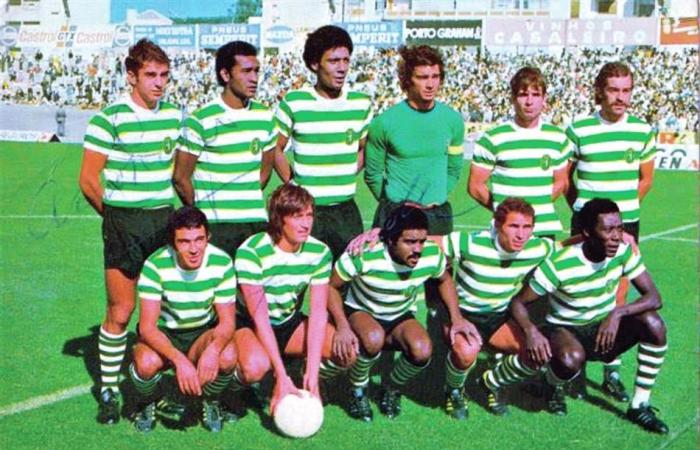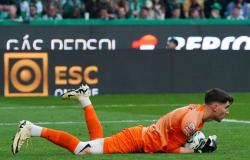The revolution put an end to the Estado Novo, but also to the hegemony of Benfica, which, in the previous decade, had been champion eight times. Football has always been part of the lives of the Portuguese and not even the 25th of April stopped the game of football. Previously, the failed coup known as Intentona das Caldas took place on the day of a classic – “On the morning of the game, the guys from Caldas came, and I told those responsible for the Army that a revolution would not happen on a Sporting-Porto day”, he stated. at the time the president of Sporting, João Rocha. Two days after the military deposed the fascist regime, the first free games for the round of 16 of the Portuguese Cup took place. At Boavista-Famalicão (5-1) there were the first signs of change, the Boavista president publicly thanked the military who, in the meantime, had been sent by Otelo Saraiva de Carvalho to guarantee security at the Bessa Stadium.
The first national football champion in freedom was Sporting, who finished two points ahead of Eusébio’s Benfica, and prevented the Reds from reaching the fourth place. Sporting, coached by Mário Lino, had a devastating forward line, led by Yazalde; won 23 of the 30 games, led from the 13th round, scored 96 goals and gave two valiant thrashings (8-0) to Montijo and Oriental. Interestingly, it was only 50 years later (2023/24) that Sporting won again by that margin. Vitória de Setúbal de Pedroto was very strong and was placed third, ahead of FC Porto. At the end of the season, six points (a victory was worth two points) separated the top four. Instead, Barreirense, Beira Mar and Montijo were relegated to the second tier. The season was also marked by the death of Porto player Pavão, in Antas, in the game against Vitória de Setúbal and by Yazalde’s record number of goals (46). It is important to note that the majority of the 16 teams that competed in the 1973/74 season were from Lisbon and the region below the Tagus. Of the teams that competed in the 1st Division (that’s what the competition was called), only six participate in League 1: Sporting, Benfica, FC Porto, Guimarães, Boavista and Farense.
The Portuguese Cup, considered the queen competition of Portuguese football, had Sporting-Benfica in the final. The lions won in extra time (2-1) and achieved what in football language is called the “double”. At that time, the competition featured teams from Portuguese colonies in Africa, such as Moxico (Angola), Textáfrica (Mozambique) and Sporting Bissau (Guinea-Bissau), but they all fell through in the fifth round. It was one of the best seasons in the history of football for Sporting, which achieved its fourth “double”, in addition to winning the Regional Reserve Championship and the National Junior Championship.
The second division was divided into two zones, with 20 clubs in each. Sporting de Espinho won in the north zone, where teams such as Braga, Chaves and Gil Vicente competed, who are now in League 1, and União de Tomar were champions in the south zone, where Portimonense competed.
The revolutionary process left some clubs in difficulties and others disappeared as they were financially supported by large industrial groups and companies linked to the previous government, such as CUF, Barreirense and Riopele, where Jorge Jesus played.
And after goodbye
Interestingly, April 25, 1974 was a Thursday, just like the 50th anniversary, that is, the day after a European journey. Those left out of the revolution were Sporting, as on the 24th they were in the German Democratic Republic (GDR) playing the second leg of the Cup Winners’ Cup semi-finals with Magdeburg. After the draw (1-1) in Alvalade, the lions were defeated (2-1) and ended up eliminated. This was the last European game for a Portuguese team under the fascist regime. After the elimination, Sporting went through a real odyssey to return to Portugal, as all flights to Lisbon had been cancelled. The solution was to fly to Madrid and then take a bus to Badajoz, but the Portuguese borders were closed. Only later did President João Rocha receive authorization for the delegation to go by bus to Lisbon, it was a long return journey that took 50 hours. Unable to contact Portugal, the players only became aware of the military coup when they reached the GDR border, but they only believed it when they stopped in Frankfurt and the news talked about the coup d’état.
The environment in Portuguese football before the revolution was one of fear and poverty. Trade union and association activity was almost nil, even so the first Professional Players Union was created in 1972, chaired by Artur Jorge. Remember that, at that time, no team made Social Security deductions, much less there was an Unemployment Fund, football was a separate business and not at all transparent. The unionization process only gained strength with the fall of the authoritarian regime. It was then that players mobilized to create a new statute and, from 1976 onwards, they were already entitled to Social Security. Equally important was the end of the Option Law, which placed players in a situation of dependence and great inequality vis-à-vis their employer. From that moment on, players were able to freely choose their club at the end of the contract.
Eusébio and Coluna were among the first to fight for footballers’ rights during the dictatorship years. “Professionalism in Portuguese football was not strong, it was a professionalism of misery. Eusébio and Coluna were the greatest examples. And these were really professionals. In the clubs on the south bank, training took place in the late afternoon because many worked to survive”, António Simões told O Jogo. Furthermore, the system was very tight, “everything was based on obedience, very strict rules, very difficult directors. Anything that got out of control or that they didn’t like, we were done in a number of eight”, acknowledged Lemos, a former FC Porto player.
Beyond football
In the transition to democracy, Sporting maintained its victorious path and was national champion in track athletics, Greco-Roman wrestling and, in cycling, won the national sprint with Manuel Gomes. Benfica won in roller hockey, in women’s volleyball and was national cycling champion with Fernando Mendes. Leixões triumphed in men’s volleyball, Belenenses won in handball, CDUL was superior in rugby and Malhangalene won the metropolitan basketball championship. Clube Desportivo da Malhangalene was from the city of Lourenço Marques, now Maputo, was part of the FC Porto branches and achieved stardom in basketball and roller hockey.
The Portuguese team was a roller hockey powerhouse and it was in complete freedom that Portugal won the world champion for the 11th time, Livramento and Rendeiro were the team’s references. The World Cup was scheduled for Luanda, but the political change forced the competition to be transferred to the Pavilhão dos Desportos, in Lisbon, in July 1974. It was in a profoundly revolutionary environment that the national team entered the ring to the sound of “Grândola, Vila Morena” by Zeca Afonso.






